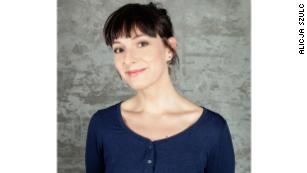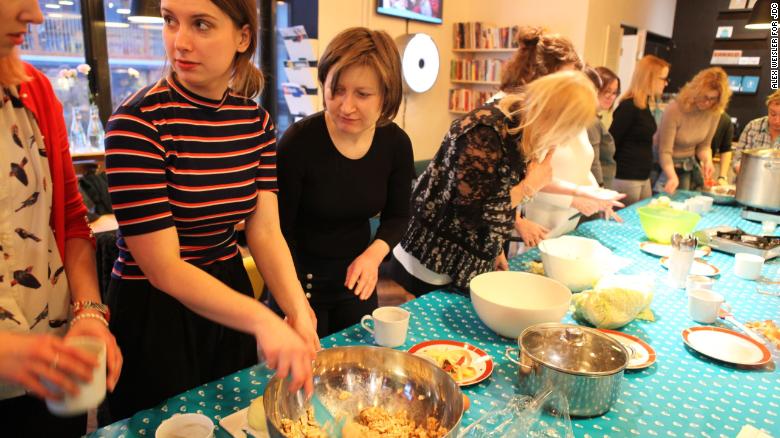 75 years after the Warsaw Ghetto uprising, Poland’s Jews are not giving up
75 years after the Warsaw Ghetto uprising, Poland’s Jews are not giving up
Agata Rakowiecka
 Agata Rakowiecka
Agata Rakowiecka
Editor’s Note: Agata Rakowiecka is the director of the JCC Warsaw. The views expressed in this commentary are her own.
Warsaw (CNN) On April 19, 1943, a brave group of Polish Jews began the Warsaw Ghetto uprising, their storied resistance against the Nazis. The ghetto fighters, although small in number and lacking in resources, dared to defy the odds. Though the uprising lasted only a month, today it is remembered as a legendary act of Jewish defiance during the Holocaust.
This anniversary is especially poignant for me as I sit in my office, just blocks away from what remains of the Warsaw Ghetto walls. I hear the bustling sounds of our capital city’s first modern Jewish Community Center.
The smell of vegan matzo ball soup reaches my office from the ground floor, where a Jewish cooking workshop is in full swing. On another floor, a group of teenagers plans a scavenger hunt for our Sunday school children in a room housing our newly opened Hebrew library. And next to my desk, Jews of different backgrounds plan the future of Limmud, a Jewish educational and cultural conference, the biggest event for Poland’s Jews, bringing together nearly 1,000 participants.
Contrary to popular opinion, Jewish life goes on here for the 10,000 to 20,000 Jews who call Poland home today.
True, conversations among us often turn to concern over the recent legislation in the Polish parliament about Holocaust history and its consequences. We also worry about the rise in anti-Semitic sentiment, outside misconceptions about our country and Jewish visitors canceling their trips.
But we are not packing our bags. Instead, we are engaging every day in a variety of activities to mark our freedom as Jews.
Since the fall of communism almost 30 years ago, we’ve made significant steps toward this freedom. In that time, many of us — Polish Jews and gentiles — have been driven by a vision of an open society built on the values of dialogue, tolerance and exploring the complexities of the past, however painful they may be. These values also enabled us to revive Jewish life.
This achievement — a vibrant and self-aware Jewish community, which cares for our needy, educates our children in Jewish tradition and protects the memory of our unspeakable loss during World War II — was made possible by three forces seemingly ignored in today’s debate on our future.

A Jewish cooking class, making vegan matzah ball soup, is part of the Warsaw Jewish Community Center’s dynamic programming for all generations. The JCC, opened in 2013, is a project of the American Jewish Joint Distribution Committee (JDC).
The first and main engine driving the resurgence of Jewish life here is the longing of local Jews for connection and identity. Whether aware of our Jewish roots or finding out when a family secret was revealed, more and more of us chose to search for the meaning of our identity. And we did so despite fears of anti-Semitism or the legacy of the Soviet ban on religion.
Growing up, I had more questions about my identity than answers. Although I knew my mother was Jewish and that I had relatives in Israel, there was no strong Jewish influence in my life. We did not celebrate Jewish holidays, did not have a formal Jewish education and were mostly exposed to the dominant Catholic culture of Poland.
And yet, my older sister began exploring our Jewish roots and urged me to join her in Jewish educational and cultural programs. These activities triggered my curiosity and a need to define myself; it led me to learn about Judaism and the history of my people. And this connected me to others with similar questions.
My path to self-discovery led to acts of community-building, to finding relevance for Jewish tradition in a modern European context and to ensure that the next generation of Jews in Poland wouldn’t need to shape their identity from scratch.
Others among my peers opted for religious observance, intellectual pursuits, social activity or artistic expression. These diverse entry points into the Jewish world were groundbreaking, given the nascent stages of Jewish life in the early 1990s.
Thankfully, we had help — the second factor in our growth as a community. It came in the form of those eager to invest in a future for Jews in Poland and in Polish-Jewish relations. They were philanthropists, advocates, religious leaders and overseas Jewish organizations like the American Jewish Joint Distribution Committee, the Jewish humanitarian group, which has aided the Jewish community here for more than 100 years, including helping to purchase arms for the Warsaw Ghetto uprising.
The fruits of this support can be found in every active synagogue, communitywide Sabbath dinner, youth club, camping experience and Jewish street festival today. The creation of the POLIN Museum of the History of Polish Jews in recent years — a joint effort of international researchers, the Polish authorities and generous benefactors from abroad — was a milestone in this process, as was the establishment of flagship JCCs in Krakow and Warsaw.
All these achievements were developed in democratic Poland, with the support of our non-Jewish neighbors, family members and local institutions. They were further strengthened by activists who were, and are, eager to speak out against hate and who believe in a Poland that embraces her minorities and is mature enough to face her history. This third factor — a more welcoming political and social landscape — has given us the confidence to continue our work in building Jewish life.
Leading up to the ghetto uprising commemoration, a group of young Jews and elderly Holocaust survivors will gather at our building for an evening of remembrance, learning and connection. They will sit in small groups, and the survivors will recount their wartime ordeals, memories of happier pre-war times, Jewish traditions and life lessons.
Gatherings likes these don’t simply provide a space for young Jews to absorb stories of horror and tragedy but to acknowledge and draw from the wellspring of positive Jewish experiences that the survivors impart.
They take the legacy of overcoming unspeakable odds, of holding onto identity and tradition, and transform it into confidence and pride for coming generations. For the seniors, it’s a critical opportunity to embrace and inform the younger generation and to celebrate Jewish life reborn.
Every chance to be together as a community reminds us of what’s really needed today, when challenges are rife and questions about our country and Jewish future abound.
Today, we need to redouble efforts at Polish-Jewish dialogue and the building of Jewish life in Poland.
Why? Because we are still here, and we are not giving it up.
Zawartość publikowanych artykułów i materiałów nie reprezentuje poglądów ani opinii Reunion’68,
ani też webmastera Blogu Reunion’68, chyba ze jest to wyraźnie zaznaczone.
Twoje uwagi, linki, własne artykuły lub wiadomości prześlij na adres:
webmaster@reunion68.com
